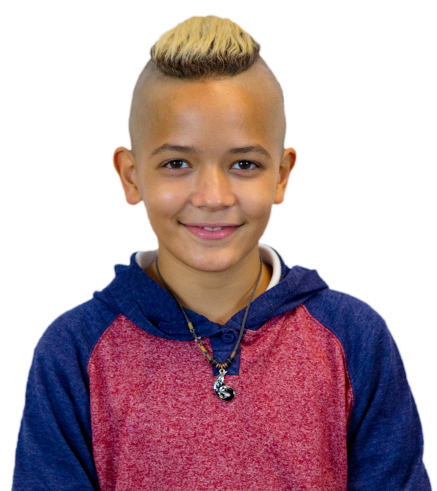Enrolling your child in a Big Brothers Big Sisters mentoring program is a great way of providing them a resource that will motivate and inspire them to ignite their potential.
It all starts with the right role models and Big Brothers Big Sisters is the place to start a friendship with one. For over 30
years, due in large part to private donations, Big Brothers Big Sisters of the Mississippi Valley has been able to recruit, screen, match, and
support mentoring friendships that have changed the lives of thousands of young people throughout Eastern Iowa and Western Illinois.
How does Big Brothers Big Sisters help Kasaius?
Matching
When Big Brothers Big Sisters works to match a Little with a Big, we take into account the needs, personality, interests, and goals of both the child and the adult volunteer. We introduce the Little and his or her family to the Big slowly and make sure everyone is fully committed to the match before it is made official. Little Brother Kasaius is outgoing and up for anything, so he needed a Big who was creative and had a variety of interests.
Relationship Management
Children like Kasaius get the most out of their one-to-one relationship with their Big when the Big, the parent or guardian, and the child talk openly with their Match Support Specialist. Working as part of the team helping the child succeed, the Match Support Specialist can help identify problems, brainstorm solutions, and connect the family with essential services.
Activities
When Kasaius’ Big Brother saw the email from BBBS saying that there were spots open in a free acting class, he jumped at the chance to take Kasaius. BBBS affiliates across the country provide activities for Bigs and Littles and also alert Bigs to opportunities in the community. This enables Bigs to get to know other Bigs, who might be experiencing similar things and who might have great suggestions for more new activities.
Screening and Training
Child safety is Big Brothers Big Sisters’ highest priority. To achieve the highest standards possible, we work constantly to review and strengthen our background check systems as new best practices in the industry emerge. We also make sure our Bigs and our staff have the training and resources they need to help Littles on their path to success.
The Impact
Children enrolled in the Big Brothers Big Sisters of the Mississippi Valley program for 12 months or longer showed the following outcomes:
Parents
You know what’s best for your child. So we’ll need your help from the start, providing information about your child’s strengths and needs, and ultimately approving the Big Brother or Big Sister match. But your role doesn’t end there.
Once the match is made, you remain closely involved in many ways, including:
• Approving activities and outings for your child and their Big Brother or Big Sister.
• Asking your child questions about those outings, and sharing what you learn with the agency staff.
• Reporting your child’s progress and milestones to the agency on a regular basis (Big Brothers Big Sisters will contact you, but we welcome your feedback any time).
• Participating in training on child safety offered by Big Brothers Big Sisters staff, and communicating with your child about the training he or she receives.
Child Enrollment Process
1) The parent/guardian calls or inquires online about the program and an interview is scheduled with an Enrollment and Match Coordinator.
2) The Enrollment and Match Coordinator completes an interview with the child and parent/guardian to assess the child's personality, interests and needs.
3) Any school or counseling reports are faxed to the appropriate party so the agency gets plenty of information on the child's behaviors and needs from outside parties. This also helps determine if a child is eligible for our program.
4) Once all the paperwork is completed, we match the child with the best possible volunteer, based upon parent/guardian preferences, child and volunteer interests, personalities, etc.

